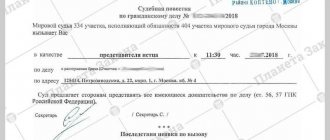Establishing the fact of death in court is a judicial process, as a result of which the relatives of the deceased citizen receive a document confirming the fact of death. After the court decision comes into force, consequences similar to biological death occur. How to recognize a citizen as dead, where to go, what documents to collect and what consequences will occur, read our article.
- Reasons for establishing the fact of death
- Who can be the plaintiff
- Algorithm of actions
State registration of death in court and out of court
According to Article 64 of the Law “On Acts of Civil Status”, civil registry offices carry out state registration of death only on the basis of:
- death document issued by a medical organization...;
- court decisions establishing the fact of death or declaring a person deceased, which entered into legal force;
- a document issued by the competent authorities about the fact of the death of a person who was unreasonably repressed and subsequently rehabilitated...
Thus, if the above documents cannot be submitted to the civil registry office, the latter must refuse state registration of death.
Having received such a refusal from the registry office, the interested person has the right to apply to the court to establish the fact of death at a certain time and under certain circumstances.
The applicant must submit to the court:
- written refusal by the civil registry office to register the death;
- evidence indicating the death of a person at a certain time, under certain circumstances.
Why is official recognition of death required?
Most often, the reason for such action on the part of relatives is the need to prepare any documents: to receive an inheritance, benefits and other payments. To issue a death certificate at the registry office, it is necessary to formally prove that the person is no longer alive. A documented court decision will be sufficient for this purpose.
At the same time, in order to submit an application, you must first visit the registry office and receive a refusal to issue a certificate there. This document is necessary for the court, otherwise the issue will not be considered.
The purpose of applying to court to establish the fact of death
Establishing the fact of death at a certain time and under certain circumstances is important when accepting an inheritance within the period established by law.
In accordance with Article 1154 of the Civil Code of the Russian Federation, an inheritance can be accepted within six months from the date of opening of the inheritance.
The period for accepting an inheritance established by Article 1154 of the Civil Code of the Russian Federation, according to Article 191 of the Civil Code of the Russian Federation, begins the day after the date of opening of the inheritance or after the date of entry into legal force of a court decision declaring a citizen dead (clause 1 of Article 1154 of the Civil Code of the Russian Federation); on the day after the date of death - the day specified in the court decision establishing the fact of death at a certain time (clause 8 of part 2 of Article 264 of the Code of Civil Procedure of the Russian Federation), and if the day is not specified - the next day after the date the court decision entered into legal force. (Clause 38 of the Resolution of the Plenum of the Supreme Court of the Russian Federation dated May 29, 2012 N 9 “On judicial practice in inheritance cases”).
In what cases should such an application be submitted?
There are two situations and, accordingly, two types of statements:
- with a request to be declared missing;
- with a request to be declared dead.
These cases are different. At the same time, a document of the second type can be submitted for a missing person. Relatives can write an application to declare a person dead if he disappeared under circumstances that leave no chance of survival, or if there are witnesses who saw his death. This includes tragic events during cataclysms, catastrophes and other similar situations. For example, a person who disappeared in an avalanche may be formally recognized as dead.
From October 1, 2019, the applicant himself sends an application with attachments to interested parties
Until October 1, 2021, the plaintiff sent to the court copies of the statement of claim and appendices to it according to the number of defendants and third parties, and the court sent the received documents to all participants in the process named in the claim.
From October 1, 2021, the plaintiff must independently send to other participants in the process a copy of the claim and other documents attached to the claim, and provide confirmation of their sending to the court (clause 6 of Article 132 of the Code of Civil Procedure of the Russian Federation). This rule also applies in special proceedings: the applicant himself is obliged to send interested parties a copy of the application and its attachments.
What does the court decision give?
The result can be positive if a person has achieved recognition of a relative as dead, or negative if the evidence is rejected. In case of refusal, it is necessary to collect additional data that may influence the court's decision.
If the document has been issued, it indicates the date of death that the court will set. It is as close to reality as possible and is based on testimony and certificates. But still, the date can be very inaccurate - it depends on the circumstances.
With the received document you need to go to the registry office to obtain a death certificate. You can then use it for the purposes for which it was requested.
Legal consequences of declaring a citizen dead
The consequences of declaring a person dead in the place where death was declared by the court are exactly the same as in case of actual death:
- inheritance opens;
- the marriage ends (SC Art. 16);
- personal obligations are terminated;
- removal from the position occurs;
- termination of pension payments, etc.
Due to the fact that the court's recognition of the deceased does not legitimize the fact of repose (there is no fact), but is only an undisputed assumption at the time of the announcement, the date of death is conventionally considered the day the court decision comes into force. In fact, a person may turn out to be alive and active, in the place where he is located he can conduct vigorous activity, make transactions and not even suspect that he has been declared deceased.
In this case, the law does not limit the rights and legal capacity of a citizen at the place of his actual residence, and all legal sanctions relate to the place where the court issued its conclusion.
Cancellation of a court decision
When the fact of death is established, a citizen cannot show up, since his death is reliably known, and those recognized as dead can make themselves known. In this case, the court cancels the previously made decision. A citizen who turns out to be alive has the right to demand the return of property that was distributed by inheritance. An exception is money and bearer securities (Article 302 of the Civil Code of the Russian Federation).
If it is proven that purchasers of inherited property through compensated transactions knew about the surviving testator, they will be obliged to return the inheritance or reimburse its value.
Any property donated free of charge is also subject to return. The time of appearance of a citizen considered dead does not matter.
It is necessary to distinguish between the concepts of establishing the fact of death, its registration and recognizing a person as dead. In all cases, you need to go to court. Why is this necessary? First of all, to protect the interests of heirs under law and will. A property inheritance case can only be opened after a death certificate is provided. Until this moment, it is impossible to dispose of the benefits of the deceased.
If the court does not satisfy the claim, you should immediately contact a lawyer, since an appeal is possible only within 10 days after the decision is made. If you miss the moment, you can be left without rights to inheritance. When to file a claim, what evidence to provide, how to achieve a positive decision - the lawyers of the ros-nasledstvo.ru portal will help you figure it out in each specific case.
FREE CONSULTATIONS are available for you! If you want to solve exactly your problem, then
:
- describe your situation to a lawyer in an online chat;
- write a question in the form below;
- call Moscow and Moscow region
- call St. Petersburg and region
Save or share the link on social networks
- FREE for a lawyer!
Write your question, our lawyer will prepare an answer for FREE and call you back in 5 minutes.
By submitting data you agree to the Consent to PD processing, PD Processing Policy and User Agreement
Useful information on the topic
25
Entering into an inheritance through the court or how to file a claim for recognition of the right to inheritance
The standard order of inheritance is a simple, strictly regulated procedure where...
49
Who repays the loan in the event of the borrower's death?
The basic law regulating relations regarding the transfer of property rights from the testator...
8
Tax on inheritance from close relatives in 2021
In Art. 217 of the Tax Code, material benefits received as a result...
31
Opening an inheritance case
Opening an inheritance case is the first and mandatory stage of accepting property...
34
Terms of inheritance after death according to law
The procedure for receiving an inheritance or a share in it after the death of someone...
20
What is better, a deed of gift or a will for an apartment?
After choosing the next owners for your property, it’s time to decide...
The procedure for declaring someone dead
If all efforts to search for a person are unsuccessful, the legislative adoption of the presumption of his death should take place in the following order:
- drawing up a statement clarifying the purpose of such recognition;
- payment of state duty;
- filing an application with the court at the place of registration of the citizen interested in recognition (Civil Procedure Code Art. 276);
- presentation of evidence (witness testimony, photos, CCTV recordings, contacting the police, banks and social services, mobile operator information about calls, correspondence, sound files, information about recent transactions involving the missing person, etc.);
- closed court hearing with the participation of the prosecutor's office;
- issuance of a court ruling.
The date of death of the missing person will be taken as the date of the court's decision. In the event of the expected/actual death of a person in the disaster area, the calendar date of the tragedy that occurred is accepted .
Statement
The application must contain the following information:
- about the missing person (all data to the maximum);
- reasons for the disappearance (if any);
- description of the situation at the time of the disappearance (if known);
- who, where, when and under what circumstances saw him for the last time;
- description of the search attempts made.
DOWNLOAD: Sample application to recognize a citizen as dead
The application is accompanied by documents confirming the missing person (all extracts and certificates received), a list of witnesses (+ contacts) and a receipt for payment of the fee.
State duty
The amount of the state duty is determined by the Tax Code Article 333.19 clause 8 and Federal Law No. 221 “On Amendments...” 2014/21/07 edition 2015/29/06; Civil Procedure Code Art. 262 clause 1 clause 3. The obligatory payment to the budget will be 300 rubles (a special case).
Required Applications
The following must be attached to the claim:
- Original and photocopy of the passport of the deceased and interested persons;
- Documents confirming the degree of relationship: birth certificate, marriage registration;
- Receipt (cheque) for payment of state duty;
- Certificates issued by a doctor at the scene of the incident or a pathologist;
- Official data about the accident that occurred: fire, explosion, disaster, flood;
- Testimony of witnesses, footage from the scene, all information that is relevant to the case.
Consideration of the application on its merits
After preparatory activities, the court sets a date for the consideration of the case. Participants in the process are sent subpoenas, copies of statements and evidence.
The applicant has the right to present additional papers in the courtroom. The court hears the arguments of both parties (applicant, registry office).
If a representative of the registration authority does not appear, then the written explanations that are available in the case materials are read out. After examining all the evidence, the court retires to the deliberation room.
Necessary expenses
When submitting an application, the interested party must pay a state fee. When establishing legal facts, 300 rubles are withheld from the applicant.
If the applicant acts through a representative, his costs will increase.
The cost of a lawyer’s services will depend on his participation in the case:
- one-time participation;
- preparing an application;
- representation in litigation;
- appeal to government authorities;
- appealing a procedural document;
- full support of the process.
Attention! Our qualified lawyers will assist you free of charge and around the clock on any issues. Find out more here.
Commentary on Article 264 of the Code of Civil Procedure of the Russian Federation
1. Legal facts, as a rule, are confirmed by various documents. For example, the fact of birth is confirmed by a birth certificate, the fact of marriage registration is confirmed by a marriage certificate. However, it is possible that a citizen cannot obtain or has lost a document confirming the existence of a fact. For these cases, a procedure is provided for establishing facts of legal significance.
Chapter 28 of the Code of Civil Procedure is devoted to one of the categories of special proceedings - the establishment of facts of legal significance. The court establishes legal facts with which the rules of law connect the emergence, change or termination of personal or property legal relations, the subjects of which can be both citizens and organizations <1>.
——————————— <1> See, for example: Determination of the Supreme Court of the Russian Federation of June 27, 2006 N 81-В06-15 // BVS RF. 2007. N 2. P. 12 - 14.
Courts accept an application to establish legal facts in cases where:
1) these facts give rise to legal consequences (emergence, change, termination of personal or property rights of citizens or organizations). For example, establishing the fact that a person is a dependent in court allows this person to apply to the social protection authorities to exercise their right to receive a pension in connection with the death of the breadwinner. Establishing legal facts in court in the future allows you to exercise your rights and obligations. This feature of legal facts established within the framework of special proceedings predetermined a special requirement for the application for establishing a fact - an indication of the purpose of its establishment. If the fact that the applicant asks to establish does not have legal significance, the judge refuses to accept the application;
2) the establishment of a fact is not related to the subsequent resolution of a dispute about law. As a special proceeding, the establishment of legal facts that give rise to, change or terminate certain legal relations is considered. However, if a demand is made to establish family relations to resolve a dispute about inheritance, it is not subject to consideration in the framework of special proceedings. In this case, you should file a claim for division of the inheritance and, within the framework of the claim proceedings, establish the facts necessary to resolve the case;
3) there is no other possibility, other than a judicial one, to obtain or restore appropriate documents certifying a legal fact. In order for the relevant authorities to take the necessary actions, a court decision is required to establish a legal fact. For example, the court establishes the fact of marriage registration, and the registry office, on the basis of a court decision, takes the necessary actions;
4) the legislation does not provide for another (extrajudicial) procedure for their establishment. In some cases, the administrative procedure for establishing legal facts may be stipulated. Thus, the following are established out of court: the causes and degree of loss of ability to work, the group and time of onset of disability (established by a medical advisory commission); facts of being in the Armed Forces of the Russian Federation, receiving injuries (established by the military department); facts of graduation from universities (established by the Ministry of Education); length of service for granting a pension (determined by social security authorities); length of service for the purpose of temporary disability benefits (established by the administration of the enterprise).
All of the above-mentioned signs of legal facts must exist in unity; the absence of at least one of them excludes the jurisdiction of the case to a court of general jurisdiction.
2. Part 2 of the commented article provides only some of the legal facts established by the court. According to the commented article, the court establishes family relationships. These relationships must have legal significance. The legal consequences of establishing the fact of a family relationship may include inheritance (registration of inheritance rights in a notary office), registration of the right to a pension in the event of the death of the breadwinner, etc.
The legal significance of the established fact is determined by substantive law (housing, pension, civil, etc.).
The court establishes the fact that the person is a dependent. This fact has legal significance for receiving an inheritance, assigning a pension in the event of the death of a breadwinner, and compensation for harm. In general, the fact of being a dependent of the deceased is confirmed by a certificate from the housing maintenance organization, and only in the absence of such a document or the impossibility of restoring the fact of being a dependent, this fact must be established in court. When establishing the fact of being a dependent, for the occurrence of a certain legal consequence, it is necessary to establish various circumstances provided for by substantive law.
The facts of registration of birth, adoption, marriage, divorce and death, established by the court, should be distinguished from the establishment of these facts, since in the first case we are not talking about establishing events, but about their registration, which is carried out in the usual manner through the registry office (Art. 3 of the Federal Law of November 15, 1997 N 143-FZ “On Acts of Civil Status” <1>). In court, these facts are established if: the registry office has not preserved the corresponding record and the registry office has refused to restore such a record (for example, this applies to church marriages concluded before 1917, and marriages concluded during the occupation, or may be related with the loss of the registry office archive during war or natural disasters, etc.); the fact of registration of birth, adoption, marriage, divorce, death can be restored only on the basis of a court decision.
——————————— <1> NW RF. 1997. N 47. Art. 5340.
If the registry office has issued a certificate stating that there is no entry in the vital registers, the court refuses to accept the application to establish the fact of registration of a civil status act.
The court also establishes the fact of recognition of paternity.
The need to establish the fact that a citizen owns title documents arises due to an error in the spelling of his name, patronymic or surname in one of the title documents, as a result of which this information does not correspond to what is indicated in the passport or birth certificate, and this error is no longer valid may be corrected by the issuing authority. For example, if an error is made in the work book and the person continues to work at the enterprise where it was issued, then the error should be corrected there. But if an error is made in a testamentary disposition in a personal bank account and the person who made the disposition has died, then a trial is necessary, otherwise the citizen will not be able to receive the money bequeathed to him.
When establishing the above facts, it is necessary to take into account that:
1) the fact of ownership of a document cannot be considered as synonymous with establishing the fact of a person’s identity;
2) the fact of the person’s work book, diploma, certificate is established, and not the fact of work or graduation from a university;
3) the ownership of only title documents, and not personal documents, is established. Due to this circumstance, the ownership of party and military cards, military personnel identification cards, passports and certificates issued by the registry office is not established.
The question often arises about the possibility of establishing in court the fact that a certificate belongs to a medal to a person whose name, patronymic or surname indicated in the certificate does not coincide with the name, patronymic or surname of this person indicated in the passport. The possibility of establishing this fact in a special proceeding depends on the emergence, change, termination of personal or property rights, as well as on the presence of the conditions specified in Art. 265, part 3 art. 263 Civil Procedure Code <1>. The following do not apply to identification documents: certificates of injuries, stay in the hospital due to injury, notifications of military units, military registration and enlistment offices and other military administration bodies about the death or disappearance of citizens due to wartime circumstances. If a document issued by the registry office contains errors, the applicant must go to court not in order to establish a legal fact, but in order to establish incorrectness in civil status records.
——————————— <1> See: Review of legislation and judicial practice of the Supreme Court of the Russian Federation for the fourth quarter of 2006 // BVS RF. 2007. N 8.
In court, the fact that a person owns a university diploma, an insurance policy, a certificate of injury, being in a hospital due to injury, etc. can be established.
In cases of establishing the fact that a title document belongs to a person whose first name, patronymic or surname indicated in the document does not coincide with the name, patronymic or surname of this person on the passport or birth certificate, the courts require the applicant to provide evidence that the title document belongs to him and that the organization that issued it does not have the opportunity to make the necessary corrections to it.
The court establishes the fact of ownership and use of real estate. In accordance with current legislation, ownership of real estate is subject to state registration. If the relevant registration authority cannot issue a document, then judicial procedure is applied. In order for the court to establish the fact of ownership and use of real estate, the following conditions must be met: 1) only the fact of ownership and use of real estate is established (the previously valid Code of Civil Procedure of the RSFSR meant only the structure, but modern legislation, as we see, has resolved this issue more broadly); 2) a refusal to issue an appropriate document has been received or it is impossible to restore it; 3) there is no dispute about the ownership of real estate; 4) the applicant had a document on ownership or use of real estate, but it was lost.
Judicial practice of recent years contains the answer to a number of questions about the possibility of establishing certain legal facts. Paragraph 6, part 2 of the commented article does not exclude the possibility of establishing the fact of ownership and use of real estate under the right of ownership. For example, if the applicant has lost a document of title confirming his ownership of real estate, then the court has the right to establish the fact of ownership and use of this property for the purpose of registration, provided that: a) such a document cannot be restored in any other manner; b) there is no dispute about the right; c) there is no possibility of establishing the fact in a different order <1>.
——————————— <1> See: BVS RF. 2007. N 6. P. 18.
The court is authorized to establish the fact of an accident as the basis for assigning a pension for: 1) disability due to a work injury; 2) in the event of the death of the breadwinner.
The fact of an accident is established by the court if: the accident report was not drawn up at all and it is not possible to draw it up at the present time, or the report was drawn up, but was lost and it is not possible to restore it out of court, or when drawing up the accident report there was an error was made that prevented recognition of the fact of the accident, and it is impossible to correct this error out of court.
The fact of the death of a person at a certain time and under certain circumstances is established by the court in the event of a refusal by the registry office to register the death, which carries it out in accordance with Art. 65 of the Federal Law “On Acts of Civil Status”. Such registration is carried out on the basis of either medical documents of the established form on the fact of the death of a person, or a document from the competent authority on the fact of the death of a person who was unreasonably repressed and subsequently rehabilitated (Law of the Russian Federation of October 18, 1991 N 1761-1 “On the rehabilitation of victims of political repression” < 1>) <2>. If the registry office refuses to register a death event, the fact of death is established in court in the absence of documents confirming the registration of death in the registry office and the impossibility of obtaining them due to the registry office’s refusal to register the death. A similar situation may occur when the body of the deceased is not found (during a fire, explosion of a residential building, plane crash, etc.).
——————————— <1> Gazette of the RSFSR. 1991. N 44. Art. 1428. <2> See: Commentary on the Civil Procedure Code of the RSFSR (scientific and practical) / Ed. M.S. Shakaryan. P. 533.
Establishing the fact of death should be distinguished from declaring a citizen dead. Declaring a citizen dead is based on the assumption of his death. When establishing the fact of death, the court must have reliable and sufficient evidence of the citizen’s death. Establishing the fact of death should be distinguished from establishing the fact of registration of death. In the first case, the event that took place (the death of a person) is established; in the second, the fact of registration of death by the registry office is established (here the fact of death is not disputed).
The court establishes the fact of acceptance of the inheritance and the place of opening of the inheritance. Acceptance of an inheritance is carried out by actually taking possession of the inherited property or by submitting an application to the notary body to accept the inheritance. If the notary is presented with the appropriate documents, but he refuses to issue a certificate of the right to inheritance, the interested person has the right to go to court not with an application to establish the fact of acceptance of the inheritance and the place of opening of the inheritance, but with a complaint about the refusal to perform a notarial act (Article 310 of the Civil Procedure Code ). When establishing the fact of acceptance of an inheritance and determining the place of opening of an inheritance, one should be guided by the norms of the Civil Code of the Russian Federation.
The list of legal facts that can be established in court, part 2 of the commented article is not exhaustive. The court has the right to establish other facts of legal significance, unless the legislation provides for a different procedure for their establishment (for example, the fact of dispossession, the fact of repression, the fact of recognizing a citizen as a prisoner of fascism, etc.). In particular, it is possible to establish the fact of receipt of wages, which is necessary to recalculate the amount of the assigned old-age pension if the wage data was not preserved due to a fire in the enterprise archive <1>. Judicial practice also knows cases of establishing the fact of a citizen’s participation in the liquidation of the consequences of the accident at the Chernobyl nuclear power plant. Establishing this fact was necessary for the citizen to receive the appropriate benefits established by Russian legislation <2>.
——————————— <1> See: BVS RF. 2002. N 6. P. 22 - 23. <2> See: BVS RF. 2002. N 5. P. 11 - 12.
The fact of acquisition of Russian citizenship by a citizen of another state cannot be established in court. Admission to Russian Federation citizenship is carried out in the manner determined by Federal Law of May 31, 2002 N 62-FZ “On Citizenship of the Russian Federation” <1>. The law does not provide for the establishment in court of the status of citizenship of the Russian Federation <2>.
——————————— <1> NW RF. 2002. N 22. Art. 2031. <2> See: BVS RF. 2007. N 11. P. 31.





